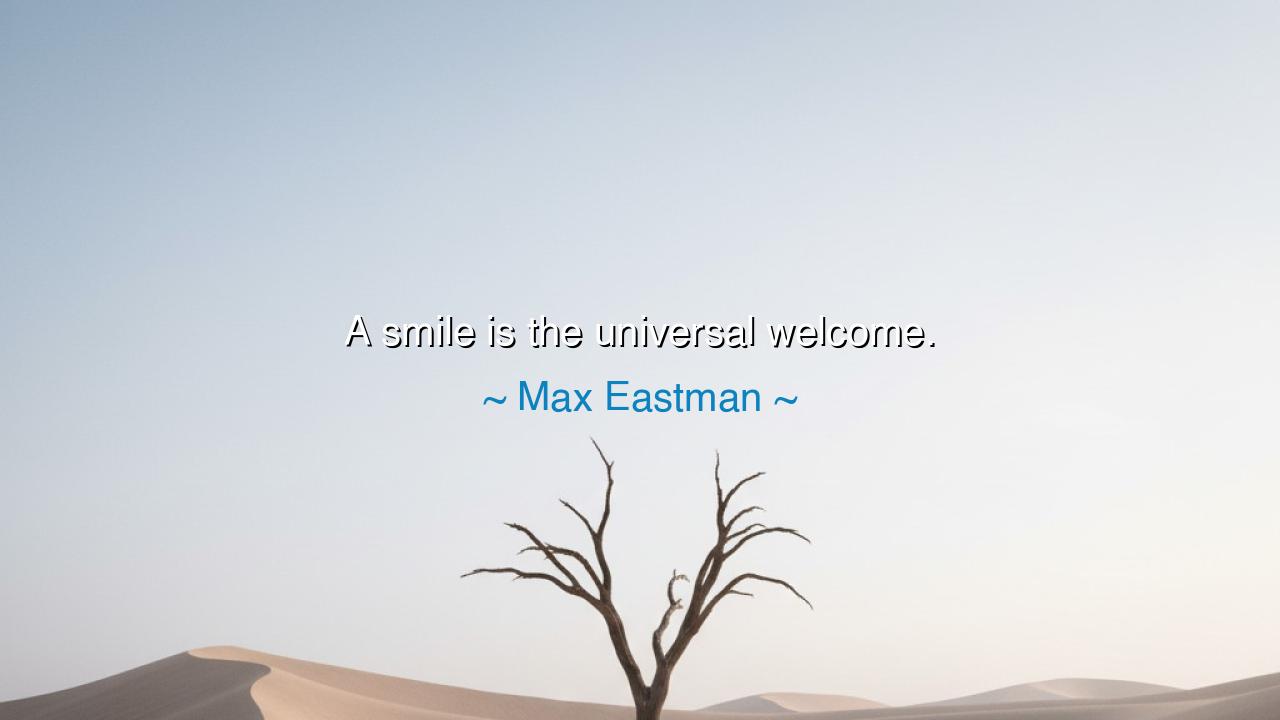
A smile is the universal welcome.






Hear the words of Max Eastman, poet and philosopher of the human spirit: “A smile is the universal welcome.” In this simple phrase lies a truth older than empires and wider than oceans—that beyond all languages, beyond all borders, beyond all divisions of race or creed, the smile speaks with one voice. It is the open gate of the heart, the gesture that says without sound, “You are safe here. You are seen. You are received.” And because it is understood by all, it is truly universal, transcending the barriers that separate one soul from another.
The ancients would have recognized this wisdom. They told of the stranger who arrives at a village and is judged not by words but by the faces that greet him. A guarded frown warns of danger; a cold stare closes the door; but a smile is the firelight of welcome, a sign that the traveler is not alone in the wilderness. Hospitality, praised as sacred in every ancient culture, begins not with bread or shelter, but with the smile that extends unseen arms of friendship. Eastman’s words echo this timeless tradition: the smile is the true threshold of every human dwelling.
Consider the story of Eleanor Roosevelt, who traveled the world in the shadow of war and division. Her speeches were powerful, her actions great, but those who met her remembered most her smile—gentle, warm, unpretentious. For men and women across nations, that expression was more convincing than any political treaty. It was her universal welcome, saying without words that every person mattered. In her smile, the forgotten felt remembered, and the powerless felt dignified.
Or look to the life of Mother Teresa, walking among the poorest of Calcutta. She had few resources to offer, but she carried the wealth of a smile. It is said that she greeted each person—beggar, orphan, dying stranger—with the same radiant expression. To some it was a farewell, to others a greeting, but always a welcome into dignity and love. For the destitute, her smile was more nourishing than food, more healing than medicine, because it told them they still belonged to the human family.
The meaning of Eastman’s words is clear: the smile is not merely a personal gesture, it is a bridge. It turns strangers into neighbors, and neighbors into friends. It is the simplest form of unity, yet also the most profound. Where words can be twisted, and laws contested, the smile cannot be misunderstood. It invites without demand, it blesses without condition, it welcomes without reservation.
The lesson for us is urgent: if you would make the world less fractured, then begin not with speeches or arguments, but with your face. Let your smile be the banner that proclaims your willingness to live in harmony with others. To smile is not weakness, nor naivety; it is strength, for it takes courage to welcome in a world that often chooses division.
Practical action follows naturally. Make it your habit to greet others with a smile, especially those who expect none. Smile at the stranger in the market, at the weary worker, at the child who looks lost. Carry it into your home, so that your family feels its warmth; carry it into your workplace, so that colleagues feel its peace. Your smile costs nothing, yet it is wealth enough to make another soul feel rich.
Thus let Max Eastman’s wisdom endure: “A smile is the universal welcome.” For in a world divided by tongues and nations, this single gesture speaks for all humanity. It is the first step toward peace, the seed of friendship, the promise that every stranger may yet find a home.






AAdministratorAdministrator
Welcome, honored guests. Please leave a comment, we will respond soon